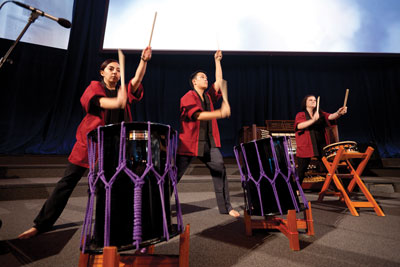

Ethnomusicology, the study of music as culture, aims at understanding how music from around the world works, why it exists, what it means, and how it reflects, references, and inflects our human condition. Ethnomusicologists come from, draw upon, and contribute to a variety of disciplines: music, cultural anthropology, folklore, performance studies, dance, cultural studies, gender studies, ethnic studies, area studies, and other fields in the humanities and social sciences.
Ethnomusicology has been a rapid growth area for UofT Music. We have research specialists in musical and cultural practices of East and Southeast Asia, India, Latin America, the Middle East and North America. Our thematic specializations include diasporic musics, transnationalism, historical ethnomusicology, music, capital and technology, the analysis of rhythm and metre, musical change, women’s music, and music, traumatic experience, and everyday life. We place particular value on methodology and fieldwork.
Music in culture and society and world music take a central role in UofT Music’s undergraduate program. The core requirements in History and Culture include ethnomusicological courses concerned with the roles of music in society and culture, and with different world musics. Advanced courses include electives for all music students, some with a performance element in them, as well as those designed to probe in some depth the history of a particular period or genre and to introduce students to research in that area. Students also have the opportunity to take part in any of the six World Music Ensembles each year, one of which is led by our annual World Music Artist-in-Residence. Those interested in pursuing ethnomusicology further may do so in the Mus.Bac. in Music History & Theory, or by completing the Music History & Culture Minor in addition to another UofT Music undergraduate program.
At the graduate level, the combination of scholarly excellence, the intimate scale of the program, and the many opportunities for interdisciplinary learning and collaboration across the UofT campus make for a vibrant, friendly, and intellectually engaging environment that attracts top-level students pursuing the course-intensive MA and the research-oriented PhD in ethnomusicology. Graduate students also benefit from the regular presence of guest speakers atthe biweekly colloquium series, graduate student roundtables and conferences. All graduate students in ethnomusicology are supported by UofT’s generous standard funding package and have the opportunity to gain professional experience through teaching and research assistantships. Our doctoral alumni teach in universities across North America.
Ethnomusicology at the University of Toronto
Ethnotes (The ethnomusicology newsletter at the University of Toronto)